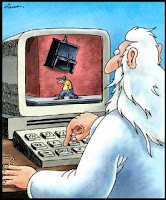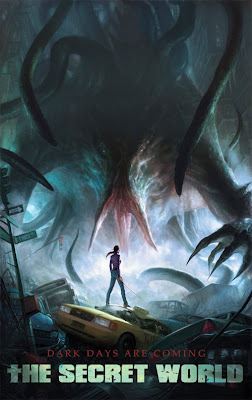Last month’s “Illustrated Guide to Cthulhu Cakes” proved to be our most popular article ever, and thus our Board of Trustees have decided to try and make this a more regular feature. The purpose of this is twofold: to generate new and interesting insight into the strange world of contemporary Lovecraftian culture, and to get more people and personalities involved in this most noble pursuit by offering them a voice, location, and audience.
For this week’s guide we bring back our venerable Director of Public Relations, Mr. Charles Ward, for an unusual and perhaps slightly disturbing foray into the genre of Lovecraftian cosmic horror. Feel free to leave comments, arguments, or rants here or on Charles’ Facebook page.
We hope you enjoy it.
Disclaimer: The LNN does not necessarily endorse or support the following opinions. Neither do we guarantee the reliability or sanity of any of the content below. In fact, we will just go ahead and wash our hands of it altogether in advance, just in case it doesn't make any sense, you don't like it, or it makes you want to sue/maim/kill us. Unless, of course, you do like it, at which time we take full credit for its presentation.
[Edit: This article covers some of the same ground as our previous entry with Matt Cardin, but just to be fair, it should be noted that this post was written a little before we heard back from Mr. Cardin; we are just lazy sloths and haven't posted it until now. Also, Mr. Cardin had nothing to do with and is in no way responsible or liable for this article]

Charles Ward is the LNN's Director of Public Relations and senior phrenological correspondent. He enjoys rhetorical altercations and leverpostej. He currently lives in a state of denial but sometimes wonders if he should stockpile emotional weaponry and secede like every single one of the unquestioningly god-fearing, American Founding Fathers wanted him to.
Don't hate me. . . I'm not the one trying to destroy the earth:
Lovecraftian Maltheism for the Pragmatic Individual
by Charles Ward
During times of crisis, the people crave a hero: a leader who can take control and bring order to the chaos. The hero often strives to not only give meaning and purpose to one's actions and unite the group, but also attempts to interpret history and provide a means of enunciation so that one's current plight is placed within some sort of context.
The desire for a suitable vocabulary with which to process one's position in the cosmos has historically been a nearly unstoppable sociological force often surpassing even the fundamental biological mechanisms of hunger, aversion to pain, and basic sexuality. Hence, many people will often choose to follow a leader who purports to offer them an answer to “why,” even if this comes at an excruciating cost.
Beyond the mere Skinnerian dynamics of Terran religiosity, which are still vehemently denied by billions of 21st century homo sapiens, the ubiquity and popularity of religious belief is not in question. For better and for worse, the contemporary heroes of religion are extremely successful in their ideological conquests.
Pat Robertson is one such hero, offering relief from the burdens of coming to terms with one's existential demons. Of course, the acceptance of his ideology comes at a steep price: one must abandon reason in favor of dogma and all the sundry implications this brings to every aspect of one's life. His dogma is notoriously gruesome, and it is why he is the perfect example for a short exercise I will now suggest.
What I propose is a nomenclatural shift of a species of thought: that the broad concept of Lovecraftian cosmic horror might be considered to be more than a literary genre or philosophical device, but as something that might be part of a pragmatic approach to contemporary life.
Maltheism, of course, has a long and rich history through dystheism, misotheism, theodicy, dualism, and fideism, due largely to the fact that religious authors through the ages have taken great pains to unapologetically anthropomorphize their gods in all the worst ways possible. Now, don't get me wrong here: we can be more nuanced than just gleefully celebrating the concept of a malevolent god like freshman in a philosophy class, though the standard exercise does prove useful to provide a starting point for my proposition. The basic tenets of maltheism might be presented the following way according to the deus deceptor analogy:
What if a malevolent space demon manifested itself to earth and demanded worship and slavery for its own selfish purposes? To string its slaves along, the demon makes two claims:
Whether or not these premises are true--or even possible to measure--is, of course, the whole point. With our limited resources of five highly subjective senses and less than a century of time to gather information before we die, all claims of verifiability or veracity of the demon’s claims are completely absurd.
What we are left with, as beings with a least some time and hopefully a bit of reason available, is to--for lack of a better vocabulary--test this hypothesis by means of the fruits of the tree a la Matthew 7:16 (Too see a concise depiction of this argument, watch this internet pundit’s take on the deus deceptor)
 This proposition is not even that controversial in religious circles outside of modern Western culture. Remember Zeus? While an inscrutable and unquenchable lust for human worship is a nearly universal trope of the divine amongst all religions, at least some imagine this to be a rather mundane and mostly nonthreatening process.
This proposition is not even that controversial in religious circles outside of modern Western culture. Remember Zeus? While an inscrutable and unquenchable lust for human worship is a nearly universal trope of the divine amongst all religions, at least some imagine this to be a rather mundane and mostly nonthreatening process.
This is not the case with Christianity and Islam, the two most dominant religions in the Western world, whose beliefs derive from some of the most violent and terrifying texts ever written. Weird fiction author Matt Cardin wrote an interesting piece for TheoFantatique recently that discusses how “the biblical God is often portrayed as a source of horror.”
In particular, the diplomatic Cardin is intrigued by Isaiah:
Isaiah can be understood as a cosmic horror story, a la Lovecraft etc., in its entirety. All that’s required is a shifting of one’s surface focus and underlying assumptions. It’s not that some parts are horrific and others aren’t, but that the whole thing can be read and — importantly — emotionally experienced that way, while remaining entirely true to its concrete content.
 This seems hard for any even slightly reasonable person to argue with. But quite frankly, I don’t think this train of though goes nearly far enough. Let’s cut the diplomacy and jump down the rabbit hole in a way only a pseudonymous avatar like Charles Ward can.
This seems hard for any even slightly reasonable person to argue with. But quite frankly, I don’t think this train of though goes nearly far enough. Let’s cut the diplomacy and jump down the rabbit hole in a way only a pseudonymous avatar like Charles Ward can.
Let’s talk about the practical implications of acknowledging the monstrosity of a god whose track record includes murder, advocating rape and incest, torture, genital mutilation, mass drownings, and whose “big plan” for the earth’s near future consists of global immolation.
Consider the following passage by Lovecraft in "The Call of Cthulhu":
That cult would never die till the stars came right again, and the secret priests would take great Cthulhu from His tomb to revive His subjects and resume His rule of earth. The time would be easy to know, for then mankind would have become as the Great Old Ones; free and wild and beyond good and evil, with laws and morals thrown aside and all men shouting and killing and reveling in joy.
Quite frankly, to its credit, the entity known as Cthulhu is not nearly as big of an ass as the god of the Old Testament, and evil is not a term that would even really apply. However, what we are after here is a means of enunciation to attempt to contextualize our position in the cosmos and cope with the calamity we see around us.
This brings us back to Pat Robertson, our previously mentioned hero of linguistic law and order. He serves the important position of being a messenger of the god of the Bible, and he provides a vocabulary and precedent for the visible horrors of existence. In all seriousness, taking it at face value, I think he must be right: it is quite logical that, according to his system of beliefs, his god would curse the people of Haiti for their sins. In fact, it is exactly the sort of thing the god of the Bible would do. Robertson just happens be brave enough to eschew the bounds of civilization and political correctness while others cower in its confines. And by brave, I mean stark raving mad.

Thus, to complete my circuitous train of thought, Pat Robertson is a hero in precisely the same way that Wilbur Whateley is a hero for the cult of Yog-Sothoth, or that Trap Jaw was a champion for Skeletor: he is a harbinger of doom and the servant of a malevolent space demon.
I'm not claiming this kind of paranoia to world events is what Lovecraft was trying to elicit with his fiction, but I am claiming that his fiction has great utility in providing a pragmatic means of enunciation for the current state of Terran life. And I propose that we can adopt this vocabulary with sacrificing our reason; to be totally honest, we can even do it without hyperbole.
The fact that the latter is true is not very good news.
If one can step aside from millennia of cultural conditioning that makes one feel inclined to exhibit a maniacal sensitivity towards other people’s dangerous superstitions, a simple analysis of Robertson and his religious colleagues’ beliefs suggests that the case for maltheism is more than strong. It is, as Cardin says about the horror of the Bible, entirely “self-evident.” The point here is not to advocate some kind of bitter anti-religious sentiment or even to advocate atheism at all. For the sake of this argument, whether or not these space beings are real is irrelevant. Quite the contrary, in fact: for the sake of our basic survival, we have to take this seriously either way--at least in a somewhat lugubrious fashion. I don’t claim to have all the answers; I merely wish to point out that, as usual, Lovecraft was right all along. To be more concise, if my sentiment was tritely condensed to a bumper sticker, it might look something like this:
Maltheism: . . . because dangerous cultists really are trying to bring about the bloody apocalypse of their malevolent, space alien gods.
You can call Lovecraft's stories of cosmic horror mere fiction if you want, but only in the same sense something like Miller’s The Crucible is mere fiction. One only has to summon the temerity to crack open a newspaper to find that the allegories are so thinly veiled as to be nearly biographical; in other words, the names have been changed to protect the author from being burnt at the stake by the guilty. Lovecraftian cosmic horror is not just a metaphor for life on earth, it provides a pragmatic political vocabulary we would do well to adopt. Let's not forget that the stakes are extremely high. It might seem reasonable to strive for a live and let live policy, but keep in mind that this is a luxury that has not, is not currently, and will not likely ever be afforded to you by any race bloodthirsty space tyrants. History is nothing but a testament, if I might borrow the phrase, of how literally and how easily people are willing to spill blood and worse for their non-Terran overlords. As the Philistines, the citizens of Dunwich, or any of He-Man's allies might tell you--those that are still alive, at least--these monstrosities cannot be reasoned with, their beliefs are not open for debate, they are impervious to science, and they are plotting right now to establish a brutal theocracy in your home city at the expense of your flesh.
Think I'm exaggerating? How is the threat of global immolation at the hands of a purported prophet an exaggeration? (See 2 Kings 1:10, and don't give me this "it's figurative" nonsense--they've already burnt scores of people in recent history!) In other words, in every case I can think of, eschatology is synonymous with war crimes and should be looked upon in the same light.
So what does one do with maltheism? Does one go mad with the realization when your mind finally begins to correlate its contents and you depart from the placid island of ignorance to view not only the black seas of infinity, but the fact that there are violent, highly aggressive, politically powerful, and terrifying mainstream forces literally preparing to bring about the end of the world. . .
I don’t think one has to. Would it be too trendy to call for a sense of Post-Lovecraftian Cosmic Horror in which one faces the blind, idiot god Azathoth or Michele Bachmann and then says,
“To hell with it. I’m not going to let that bitch ruin my day.”
Is it denial? Maybe. Considering the low percent of neural matter we humans have available to process information, I am not totally sure we can get around it. But that's okay, too. Remember, from a biological perspective, we are just trying to avoid the death our species by religious genocide.
At the very least, as I suggested earlier, we can shift the terminology we use. If a group believes in a superstition that involves one or more malevolent entities of an extraterrestrial or multidimensional origin, and their beliefs or "holy" texts overtly call for the destruction of the earth and/or violent subjugation and torture of non-believers, let's quit coddling them by pandering to "faith" and "religion." These people are doomsday cultists who worship evil space monsters. This change in terminology is not intended to be hostile or vengeful, though such reactions would not seem unwarranted at this point, but it would serve two clear purposes:
This is not a polished argument, and it is certainly not a definitive one. It is merely a collection of thoughts and reactions to recent world events I have been processing for the last month of so. Putting them down in writing helps me to think things through more clearly, which hopefully leads to the successful reevaluation and refinement of my ideas so I can better deal with the temporality of my existence—whether it is enforced by malevolent forces or those of a more benign variety. If this exercise turns out to be for no other reason than for my own selfish, intellectual pleasures, then so be it.
And so I say to them--with a gleam in my eye--what I imagine the professorial staff of Miskatonic University might have said to Wilbur Whateley,
Viva la Résistance.

Hot Off the Press

- "Debunking the Lovecraftian Occult" by Thomas Jude Barclay Morrison
- Lovecraft and National Geographic
- House of Black Wings to be released
- Ruminations on Resurrection & New Ribbon Campaign
- An illustrated guide to Maltheism
- Paul Carrick offers unique Lovecraftian fundraiser

- Matt Cardin on Dark Awakenings
- The Cult of Cthulhu is now an 501(c)(3): Venger Satanis
- The Contrarian on his haunt rock album Eldritch Musicks
- Paul Blake from ToyVault shares the history of Plush Cthulhu
- Danish publisher H. Harksen on his new anthology
- Historian and blogger Chris Perridas
- More interviews. . .

- Shadowcast Audio Anthology (Fiction)
- The Innsmouth Free Press (Fiction/Faux News)

Welcome to the LNN
View our Mission Statement
"Sometimes I believe that this less material life is our truer life, and that our vain presence on the terraqueous globe is itself the secondary or merely virtual phenomenon." -HPL
Stay apprised of all that's cyclopean: Follow us on Facebook and Twitter.
"Sometimes I believe that this less material life is our truer life, and that our vain presence on the terraqueous globe is itself the secondary or merely virtual phenomenon." -HPL
Stay apprised of all that's cyclopean: Follow us on Facebook and Twitter.
Too worn down by existential angst to read? Watch some of our favorite clips instead.
Contribute News
Are you an author, filmmaker, or artist? Send us a press release!
Have a request for something you want us to cover?
Have a request for something you want us to cover?


































2 comments
Comment by echeck casino on March 28, 2011 at 6:43 PM
Bravo, the excellent answer.
Comment by ThatGuy on June 10, 2013 at 11:32 AM
For what it's worth, you've opened my eyes to a new way of seeing certain religions. It's such an obvious similarity I can't believe it hadn't occurred to me before. Like the other guy said, bravo!
Post a Comment